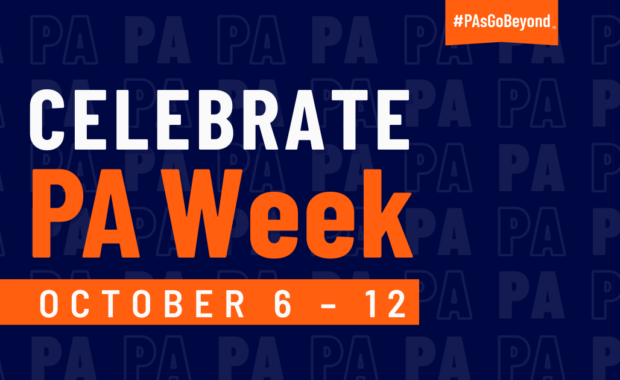Q and A on PA Reimbursement for Medicare Hospice Services
PAs Can Establish and Review Patient Plan of Care
March 27, 2019
By AAPA Reimbursement Department
Q. What is hospice care?
A. Hospice is medical and nursing care focused on supporting the comfort and quality of life of patients who are terminally ill.
Q. What was Medicare policy regarding PAs and hospice services prior to January 1, 2019?
A: Until this year, Medicare policy was fairly restrictive with regard to PAs (physician assistants) and hospice care. PAs were not permitted to provide care that was directly related to a hospice patient’s terminal illness. Similar health professionals, physicians and nurse practitioners (NPs), were able to provide and be reimbursed, for these services.
Q. What changed on January 1, 2019 regarding Medicare’s hospice policy?
A. The Bipartisan Budget Act of 2018 and subsequent accompanying regulations, as a result of advocacy work of the AAPA, have expanded care options for hospice patients by broadening the Medicare definition of hospice “attending physician” to include PAs. Starting January 1, 2019, PAs, like physicians and NPs, are permitted to provide, manage, and have such hospice services reimbursed by Medicare. This will enable PAs in this capacity to establish and review a hospice patient’s plan of care.
[AAPA Reimbursement Resources]
Q. Why is this important to patients?
A. Patients who receive a diagnosis of terminal illness should be able to focus on working with healthcare professionals to manage their disease, deal with pain control, concentrate on the quality of their life and other end-of-life matters without having to face unnecessary barriers to accessing hospice care. The omission of PAs from providing care to this patient population threatened to exacerbate patient access difficulties and weaken continuity of care. The Bipartisan Budget Act of 2018 took an important step in addressing these concerns. The intent of adding PAs to the term “attending physician” was to expand the number of providers to care for the hospice population. This will also ensure greater continuity of care so that patients that have PAs as their primary provider of care can continue to have the health professional who knows them best participate in their care provision.
Q. Are there any other limitations on PAs providing hospice care?
A. There are some aspects of hospice care that PAs are still not permitted to provide. For example, only a physician or medical director may certify terminal illness, only a medical director may admit a patient to a hospice, and PAs cannot take the position of a physician as one of the required members of an interdisciplinary group (hospice physician, registered nurse, social worker, and pastoral or other counselor). These restrictions apply to NPs as well.
There remain two services that can be provided by both physicians and NPs, but not PAs. The first is conducting a face-to-face encounter prior to recertification for hospice care. Prior to initial certification, a physician or medical director is required to certify terminal illness. Only physicians are able to perform that task under Medicare. This qualifies a patient for a 90-day hospice period. After 90 days, a medical director must recertify terminal illness. After 180 days have passed, prior to recertification by the medical director again (for 60-day periods from this point forward), a face-to-face encounter must occur. NPs, while not permitted to recertify terminal illness, are permitted to conduct the face-to-face encounter to determine continued eligibility. PAs are not given the ability to conduct this face-to-face encounter. AAPA is working with CMS and Congress to find a solution to the face-to-face encounter exclusion.
The second service that can be provided by both physicians and NPs but cannot yet be done by PAs is prescribing medications for hospice patients. While the law and regulations that granted PAs attending physician status were widely seen as granting PAs the ability to provide nearly all services an NP previously could under hospice (with the exception of conducting the face-to-face encounter prior to recertification), CMS’ Hospice Conditions of Participation (CoPs) team has recently indicated to AAPA that there is language in the Hospice CoPs that, until changed, further restricts a PA’s ability to order medications. The position of CMS is that, while PAs can now act in the role of an attending physician, due to continued language in the Hospice CoPs (42 CFR 418.106(b)), PAs are unable to personally make orders for medication for hospice patients. This would require a change to Hospice CoPs, which must result from a regulatory process of opening up the Hospice CoPs for comment. As the Hospice CoPs are discretionary, there is no definitive timeline available for when this may occur. NPs were able to have this language modified for them a decade ago when the Hospice CoPs were open for comment. AAPA is working with the National Hospice and Palliative Care Organization, senior CMS officials and members of Congress to help resolve the issue as soon as possible.
Finally, restrictive language regarding hospice established before CMS’ policy change may still exist in state laws and regulations. Any PA interested in providing care as a hospice attending physician should confirm that their state laws and regulations do not prevent PAs from acting in this capacity. For questions regarding restrictive hospice language in your state, contact Erika Miller at [email protected].
More Resources
PAs in Hospice and Palliative Medicine
PAHPM Helps to Develop Palliative and Hospice Care CME
PAs in Hospice and Palliative Care
For more information, contact AAPA’s Reimbursement Department at [email protected].
Thank you for reading AAPA’s News Central
You have 2 articles left this month. Create a free account to read more stories, or become a member for more access to exclusive benefits! Already have an account? Log in.



